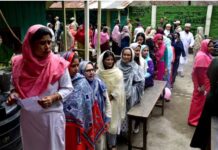The Rana Plaza tragedy took place close to Labour Day. What does this say about us?
Every year, Bangladeshi rights-based organisations, civil society, and the media highlight workers’ rights and welfare on Labour Day. Street demonstrations are arranged, seminars are held, talk shows are aired, and various activities take place to emphasise the spirit of the day.
But International Labour Day 2013 was completely different in Bangladesh. Rana Plaza collapsed on April 24, just six days prior to the day. According to the government, more than 1,100 people died and about 2,500 were rescued from the disaster. A total of 3,565 people – dead and alive – were pulled out of the rubble.
In the aftermath of the disaster, various international multi-stakeholder initiatives were created, bringing together global brands, trade unions, NGOs, and the International Labour Organisation (ILO). The goal was to improve building and fire safety codes of textile factories in Bangladesh, as well as to compensate Rana Plaza survivors and victims’ families.
Non-government organisations and multinationals took supportive measures after the accident. The government, BGMEA, and many development partners, international organisations, and retailers made a host of pledges, some immediate and some long-term, to the victims and the garment sector at large. BRAC programs also took on supportive initiatives on a long-term and short-term basis.
In response to such a great loss, major support initiatives were anticipated from the government and the BGMEA. The BGMEA has formed a supportive fund, which asked each member to contribute a minimum amount of Tk25,000. But only about a quarter of the members contributed to the fund. Later, BGMEA became silent regarding this supportive initiative. Considering the slow progress for supportive measures, requests have been placed recently to international garment brands to help mitigate the damage by assisting with the full restitution of those who were injured or the families of those who lost their lives.
Labour Day is not only significant for the original eight hours’ work demand, but it gives an opportunity to honour the workers and the labour movement for their hard work, dedication, and their contribution to economic and social growth and development. It also forces many others to think about securing workers’ rights and to ensure worker’s safety and security at the workplace.
The international community has declared the one-year anniversary of the Rana Plaza collapse as Fashion Revolution Day to commemorate this tragic event. But the question is, why are we compelled to find separate days for different welfare issues for workers? Fashion Revolution Day is not completely unwanted or unnecessary. It’s always better to identify a date to remember the lessons from tragic events. But then what about the significance of International Workers’ Day?
This day promises to remember and consider the issues around workers’ welfare. Though Bangladesh observes the day annually, the Rana Plaza tragedy took place close to Labour Day. What does this say about us? Have we been dishonest with the promises we made while observing International Workers’ Days in past years? This might be the reason behind inadequate results in the endeavour to have policies ensuring secure and safe workplaces for Bangladeshi workers. Do we need another day to remember secure workplace rights for workers? Let’s think about that before the next tragedy strikes.
Source: Dhaka Tribune










